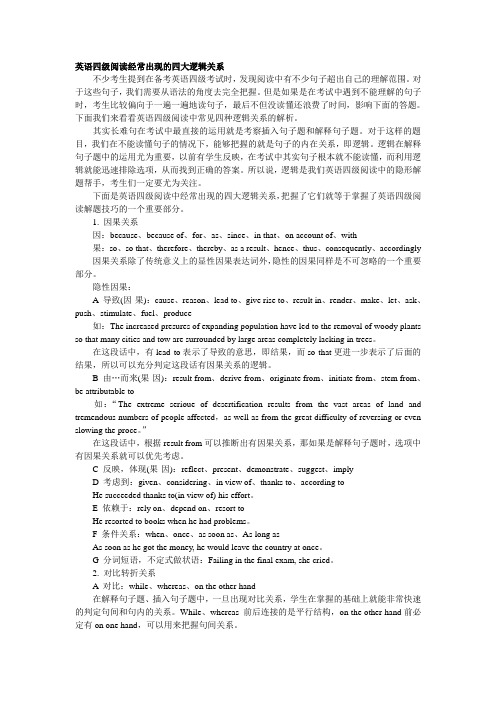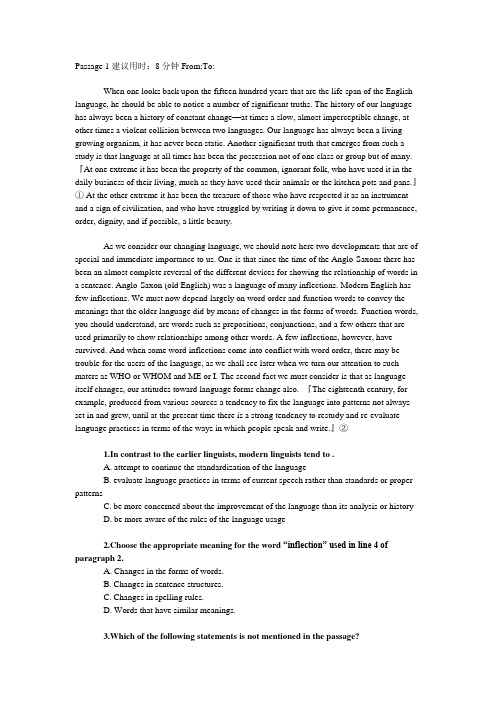四级阅读长难句
英语四大逻辑关系

英语四级阅读经常出现的四大逻辑关系不少考生提到在备考英语四级考试时,发现阅读中有不少句子超出自己的理解范围。
对于这些句子,我们需要从语法的角度去完全把握。
但是如果是在考试中遇到不能理解的句子时,考生比较偏向于一遍一遍地读句子,最后不但没读懂还浪费了时间,影响下面的答题。
下面我们来看看英语四级阅读中常见四种逻辑关系的解析。
其实长难句在考试中最直接的运用就是考察插入句子题和解释句子题。
对于这样的题目,我们在不能读懂句子的情况下,能够把握的就是句子的内在关系,即逻辑。
逻辑在解释句子题中的运用尤为重要,以前有学生反映,在考试中其实句子根本就不能读懂,而利用逻辑就能迅速排除选项,从而找到正确的答案。
所以说,逻辑是我们英语四级阅读中的隐形解题帮手,考生们一定要尤为关注。
下面是英语四级阅读中经常出现的四大逻辑关系,把握了它们就等于掌握了英语四级阅读解题技巧的一个重要部分。
1. 因果关系因:because、because of、for、as、since、in that、on account of、with果:so、so that、therefore、thereby、as a result、hence、thus、consequently、accordingly 因果关系除了传统意义上的显性因果表达词外,隐性的因果同样是不可忽略的一个重要部分。
隐性因果:A 导致(因-果):cause、reason、lead to、give rise to、result in、render、make、let、ask、push、stimulate、fuel、produce如:The increased presures of expanding population have led to the removal of woody plants so that many cities and tow are surrounded by large areas completely lacking in trees。
英语四级阅读理解练习附答案

英语四级阅读理解练习附答案导读:我根据大家的需要整理了一份关于《英语四级阅读理解练习附答案》的内容,具体内容:下面是我整理的,希望对大家有帮助。
Culture is one of the most challenging elements of the international ma...下面是我整理的,希望对大家有帮助。
Culture is one of the most challenging elements of the international marketplace. 『This system of learned behavior patterns characteristic of the members of a given society is constantly shaped by a set of dynamic variables: language, religion, values and attitudes, manners and customs, aesthetics, technology, education, and social institutions.』① To cope with this system, an international manager needs both factual and interpretive knowledge of culture. To some extent, the factual knowledge can be learned; its interpretation comes only through experience.The most complicated problems in dealing with the cultural environment stem from the fact that one cannot learn culture—one has to live it. Two schools of thought exist in the business world on how to deal with cultural diversity. One is that business is business the world around, following the model of Pepsi and McDonalds. In some cases, globalization is a fact of life; however, cultural differences are still far from converging.The other school proposes that companies must tailor business approaches to individual cultures. Setting up policies and procedures in each country has been compared to an organ transplant; the critical question centers around acceptance or rejection. The major challenge to the international manager is to make sure that rejection is not a result of cultural myopia or even blindness. Fortune examined the international performance of a dozen large companies that earn 20 percent or more of their revenue overseas. The internationally successful companies all share an important quality: patience. They have not rushed into situations but rather built their operations carefully by following the most basic business principles. These principles are to know your adversary, know your audience, and know your customer.1. According to the passage, which of the following is true?A. All international managers can learn culture.B. Business diversity is not necessary.C. Views differ on how to treat culture in business world.D. Most people do not know foreign culture well.2. According to the author, the model of Pepsi .A. is in line with the theories of the school advocating the business is business the world aroundB. is different from the model of McDonaldsC. shows the reverse of globalizationD. has converged cultural differences3. The two schools of thought .A. both propose that companies should tailor business approaches to individual culturesB. both advocate that different policies be set up in different countriesC. admit the existence of cultural diversity in business worldD. Both A and B4. This article is supposed to be most useful for those .A. who are interested in researching the topic of cultural diversityB. who have connections to more than one type of cultureC. who want to travel abroadD. who want to run business on International Scale5. According to Fortune, successful international companies .A. earn 20 percent or more of their revenue overseasB. all have the quality of patienceC. will follow the overseas local culturesD. adopt the policy of internationalizationVocabulary1. dynamic adj. 动态的2. variable n. 变量aesthetics n. 美学4. factual adj. 事实的5. interpretative adj. 解释的6. converge v. 聚合7. transplant v. 移植8. myopia n. 近视 9. adversary n. 对手长难句解析①【解析】此句虽然很长,但考生只要认清它的主干,就很容易了解本句的意思。
大学英语四六级复习资料总汇

[url=/readtopic.php?forumid=40&topicid=458010]最新四六级历年真题在线听力[并非幻觉][/url][url=/readtopic.php?forumid=40&topicid=458000]======四级重要词汇分类记忆======[yinio][/url][url=/readtopic.php?forumid=40&topicid=458005]===========四级阅读超精读===========[yinio][/url][url=/readtopic.php?forumid=40&topicid=458008]======新东方四、六级写作背诵范文选======[yinio][/url][url=/readtopic.php?forumid=40&topicid=453585]大学英语四、六级考试[应试篇]----请不要回帖!!![紫莜][/url][url=[url=/readtopic.php?forumid=40&topicid=458017]************六级常考词频(新东方老师总结)**********[紫莜][/url][url=/readtopic.php?forumid=40&topicid=458029]***********大学英语CET六级词汇总结***********[[紫莜][/url][url= /readtopic.php?forumid=40&topicid=457061]上海交大预测作文卷[cxx8108][/url][url=/readtopic.php?forumid=40&topicid=456044]大学英语140页[xjjxyjy] [/url][url=/readtopic.php?forumid=40&topicid=430147]六级综合改错题应对策略[忘海悦人][/url][url=/readtopic.php?forumid=40&topicid=438738] **************短期突破:王长喜六级资料[标准阅读60篇]***********[紫莜] [/url][url=/readtopic.php?forumid=40&topicid=422000]CET-4常考、常用短语![短期突破][/url](紫莜)[url=/readtopic.php?forumid=40&topicid=421937]六级单词不用愁,尽在此帖中[url=/readtopic.php?forumid=40&topicid=423163]【推荐】四级技巧集合[/url](叶随风)[url=/readtopic.php?forumid=40&topicid=421992]HOT~《大学英语四级语法精要》附:EBOOK下载[url=/readtopic.php?forumid=40&topicid=414667]*****《泰坦尼克号》电影原版剧本!连阅读的好东西哦******[/url](紫莜)[url=/readtopic.php?forumid=40&topicid=416391]世界名著《简爱》经典下载版,踩过cet4、6阅读的好东西[/url](紫莜)[url=/readtopic.php?forumid=40&topicid=413061]新东方四级词汇笔记非常完整版下载[/url](紫莜)[url=/readtopic.php?forumid=40&topicid=417026]****四级90分必备词汇****[cet4要考高分来]![url=/readtopic.php?forumid=40&topicid=411295]一网友的背单词法(转贴)[/url](紫莜)[url=/readtopic.php?forumid=40&topicid=411299]≮四级核心词笔记≯(针对性强!)[/url](紫莜)[url=/readtopic.php?forumid=40&topicid=411300]为作文添彩!200条谚语!!(望大家多多支持!)[/url](紫莜)[url=/readtopic.php?forumid=40&topicid=411297]CET4、6作文过关技巧句型!:)[/url](紫莜)[url=/readtopic.php?forumid=40&topicid=411303]再来贡献~/阅读常考1000词上下/:)[/url](紫莜)[url=/readtopic.php?forumid=40&topicid=411287]四级英语短期突击对策(应付12月考试)[/url](紫莜)[url=/readtopic.php?forumid=40&topicid=411292]阅读难点关键句200句(连载)层层渐进[url=/readtopic.php?forumid=40&topicid=412536]阅读难点关键句200句下载版!~[/url](紫莜)[url=/readtopic.php?forumid=40&topicid=412547]Who Moved My Cheese 英语版下载!(书+mp3)[/url](紫莜)[url=/readtopic.php?forumid=40&topicid=388808]新东方阅读词汇pdf[/url][url=/readtopic.php?forumid=40&topicid=388800]我要过六级之考试词汇天天练[/url][url=/readtopic.php?forumid=40&topicid=388795]英语四级大纲单词集[/url][url=/readtopic.php?forumid=40&topicid=385477]四六级作文基本句式(可爱多82)[/url][url=/readtopic.php?forumid=40&topicid=378860]思马得记忆法词汇记忆组群163篇--四级[/url][url=/readtopic.php?forumid=40&topicid=357840][下载]新东方背诵作文50篇[/url][url=/readtopic.php?forumid=40&topicid=357456]司马得四六级英语词汇记忆法文本及mp3下载(alinw)[/url][url=/readtopic.php?forumid=40&topicid=355221]2003年12月四级考试写作范文和听力录音稿(s.e.a)[/url][url=/readtopic.php?forumid=40&topicid=354058]练口语,背单词-6级(待续)(yyytjtg)[/url][url=/readtopic.php?forumid=40&topicid=354644]巧背单词(潘潘820)[/url][url=/readtopic.php?forumid=40&topicid=353534]逆向法大全(超长浓缩版)(s.e.a)[/url][url=/readtopic.php?forumid=40&topicid=353697]常用英语构词法(不可不看)~(heaven88)[/url][url=/readtopic.php?forumid=40&topicid=349055]大学英语六级考试词汇思马得记忆法(angel_jing36)[/url][url=/readtopic.php?forumid=40&topicid=344468]英语逆向学习法[/url][url=/readtopic.php?forumid=40&topicid=344471]王长喜六级考试标准阅读60篇[/url][url=/readtopic.php?topicid=342458&forumid=40]胡敏读故事记单词(六级词汇)[/url][url=/readtopic.php?forumid=40&topicid=338976]smart四级词汇记忆组群[/url][url=/readtopic.php?forumid=40&topicid=338974]洪恩语法辞典书下载[/url][url=/readtopic.php?forumid=40&topicid=338953]《大学英语六级考试高分得主经验谈》电子书[/url][url=/readtopic.php?forumid=40&topicid=317487]2003年12月六级考试参考答案(A)[/url][url=/readtopic.php?forumid=40&topicid=317489]03年12月四级考试(B卷)参考答案[/url][url=/readtopic.php?forumid=40&topicid=316704]中国名校四级密卷---上海外国语大学卷[/url][url=/readtopic.php?forumid=40&topicid=314900]听力小对话神蒙原则!不看会后悔的(高温瑜珈)[/url][url=/readtopic.php?forumid=40&topicid=314553]英语语法电子书下载[/url][url=/readtopic.php?forumid=40&topicid=312714]六级历年听力下载(清晰)(闻非丧胆)[/url][url=/readtopic.php?forumid=40&topicid=311023]新东方张亚哲四六级英语考试词汇总结下载[/url][url=/readtopic.php?forumid=40&topicid=311022]四级考试词汇全新归类下载[/url][url=/readtopic.php?forumid=40&topicid=311021]英语四六级作文权威模板打印版[/url][url=/readtopic.php?forumid=40&topicid=308332]四六级考前必看写作句型与过渡词语(含翻译)[/url][url=/readtopic.php?forumid=40&topicid=308327]50个最容易出错的语法题(错20个不奇怪)[/url][url=/readtopic.php?forumid=40&topicid=308214]英语四级常用短语汇总[/url][url=/readtopic.php?forumid=40&topicid=308219]2003年12月大学英语四级考试模拟试题及答案[/url][url=/readtopic.php?forumid=40&topicid=308220]快考试了,大家来练练CLOZE(高温瑜珈)[/url][url=/readtopic.php?forumid=40&topicid=300412]大学英语词汇星火式巧记速记1-6级全套mp3录音下载(1-30课)[/url][url=/readtopic.php?forumid=40&topicid=299306]大学英语四级思马得记忆法MP3下载[/url][url=/readtopic.php?forumid=40&topicid=304936]思马得大学英语四级词汇80篇文本版下载[/url][url=/readtopic.php?forumid=40&topicid=296027]大学英语四六级历年真题下载[/url][url=/readtopic.php?forumid=40&topicid=288172]03六级大纲词汇下载[/url][url=/readtopic.php?forumid=40&topicid=299595]CET4长难句结构分析最新经典100句(例句来源于真题)(magma)[/url][url=/readtopic.php?forumid=40&topicid=301171]新东方cet 4的网络课程总结(PDF版)(magma)[/url][url=/readtopic.php?forumid=40&topicid=300651]大学英语六级听力考试的三个锦囊(高温瑜珈)[/url][url=/readtopic.php?forumid=40&topicid=297133]新东方张亚哲四六级考试词汇总结(高温瑜珈)[/url][url=/readtopic.php?forumid=40&topicid=293788]四级词汇训练1200题(高温瑜珈)[/url][url=/readtopic.php?forumid=40&topicid=300167]大学英语六级93-95听力真题+MP3下载[/url][url=/readtopic.php?forumid=40&topicid=299344]CET6高频词汇下载[/url][url=/readtopic.php?forumid=40&topicid=300368]非常详细的虚拟语气讲解资料,四六级绝对有用![/url][url=/readtopic.php?forumid=40&topicid=264800]大学英语四级高频词汇下载[/url][url=/readtopic.php?forumid=40&topicid=298288]45天搞掂英语四级(高温瑜珈)[/url][url=/readtopic.php?forumid=40&topicid=300371]英语阅读常考1000词[/url][url=/readtopic.php?forumid=40&topicid=299608]新东方老师的四级语法提纲(好不容易才搞到的啊)(salira)[/url][url=/readtopic.php?forumid=40&topicid=299589]我的评卷心得——来自四六级评卷老师(salira)[/url][url=/readtopic.php?forumid=40&topicid=234993]英语谚语300句(好就顶一下哦!!!)(yanmingmin)[/url][url=/readtopic.php?forumid=40&topicid=300652]大学英语四六级考试万能作文试题模板(高温瑜珈)[/url][url=/readtopic.php?forumid=40&topicid=299638]长难句结构分析最新经典一百句(salira)[/url][url=/readtopic.php?forumid=40&topicid=297134]王长喜六级阅读160篇(高温瑜珈)[/url][url=/readtopic.php?forumid=40&topicid=294437](四级)历年英语四级"名词题"解析(lesile)[/url][url=/readtopic.php?forumid=40&topicid=297131]CET 考试作文锦囊16 篇(高温瑜珈)[/url][url=/readtopic.php?forumid=40&topicid=281110]背单词的五大捷径(高温瑜珈)[/url][url=/readtopic.php?forumid=40&topicid=297129][恶补英文]10天背诵英文10000单词◎教程(高温瑜珈)[/url][url=/readtopic.php?forumid=40&topicid=297371]网上王长喜四六预测试卷八套(高温瑜珈)[/url][url=/readtopic.php?forumid=40&topicid=294084]三十五个经典句型帮你过写作关(201)[/url][url=/readtopic.php?forumid=40&topicid=295605]四级名词词组和固定搭配(salira)[/url][url=/readtopic.php?forumid=40&topicid=305495]12月27号考试,请大家掌握以下作文中用的句型[/url]。
四级阅读常见问题及解决办法

常见问题第一,读不懂所谓读不懂,就是考生拿过文章,满头雾水,即使硬着头皮读文章,也是一知半解。
然后匆忙做体,仅凭感觉去蒙,因此做体准确率必然不高。
第二,读不快读不快表现为,文章读完了,题也做完了,但往往是比考试要求多用15乃至20多分钟的时间。
于是影响了其他问题的有效解答。
匆忙起笔,必然影响整个四级的考试成绩。
第三,做不对就是虽然文章也读懂了,但是一做题就错。
解决办法第一、掌握正确的阅读方法考生平时阅读一般会采取两种阅读方法。
一种是先看文章后看问题;另一种是先看问题,带着问题读文章。
那么究竟哪一种方法比较好呢?笔者认为还是先看问题后读文章比较好。
原因在于,先看问题,你可以熟悉出题人的出题角度。
并且有题干,你可以划出题干的关键词,特别是四级考试中有一类题目属于“指代题或词汇题”,如下所示:(一)词汇题显著问法:the word “XXXX”(line X, part X) most probably means?(二)指代题显著问法:1.代词指代:the pronoun“it/those/that/them” (line X, part X) refers to ?2.名词指代:the word “XXXX”(line X, part X) refers to?先看问题后看文章的好处就在于,可以通过问题先把上述“核心词”在原文中划出,然后再读文章的过程中,一旦读到,注意力就会高度集中,这样有助于提高做题的准确性。
由此得出正确的阅读方法就是“五步阅读法”:第一步,扫描题干抓关键。
即首先看选项,划出题干中的的关键词。
题干关键词包括:数字、人名地名、专有名词、引号里的词语等等。
第二步,快速浏览全文,把握文章主旨大意标重点。
即快速浏览文章。
在快速浏览文章的时候,不需要每一个单词和句子都读得懂,没有时间也没有这个必要。
在第二步的过程中,考生们所要做的就是首先弄清楚这篇文章的中心思想是什么;其次,用笔在试卷上面标记出考试要考的重点。
英语四级阅读15篇

Passage 1建议用时:8分钟From:To:When one looks back upon the fifteen hundred years that are the life span of the English language, he should be able to notice a number of significant truths. The history of our language has always been a history of constant change—at times a slow, almost imperceptible change, at other times a violent collision between two languages. Our language has always been a living growing organism, it has never been static. Another significant truth that emerges from such a study is that language at all times has been the possession not of one class or group but of many. 『At one extreme it has been the property of the common, ignorant folk, who have used it in the daily business of their living, much as they have used their animals or the kitchen pots and pans.』① At the other extreme it has been the treasure of those who have respected it as an instrument and a sign of civilization, and who have struggled by writing it down to give it some permanence, order, dignity, and if possible, a little beauty.As we consider our changing language, we should note here two developments that are of special and immediate importance to us. One is that since the time of the Anglo-Saxons there has been an almost complete reversal of the different devices for showing the relationship of words in a sentence. Anglo-Saxon (old English) was a language of many inflections. Modern English has few inflections. We must now depend largely on word order and function words to convey the meanings that the older language did by means of changes in the forms of words. Function words, you should understand, are words such as prepositions, conjunctions, and a few others that are used primarily to show relationships among other words. A few inflections, however, have survived. And when some word inflections come into conflict with word order, there may be trouble for the users of the language, as we shall see later when we turn our attention to such maters as WHO or WHOM and ME or I. The second fact we must consider is that as language itself changes, our attitudes toward language forms change also. 『The eighteenth century, for example, produced from various sources a tendency to fix the language into patterns not always set in and grew, until at the present time there is a strong tendency to restudy and re-evaluate language practices in terms of the ways in which people speak and write.』②1.In contrast to the earlier linguists, modern linguists tend to .A. attempt to continue the standardization of the languageB. evaluate language practices in terms of current speech rather than standards or proper patternsC. be more concerned about the improvement of the language than its analysis or historyD. be more aware of the rules of the language usage2.Choose the appropriate meaning for the word “inflection” used in line 4 of paragraph 2.A. Changes in the forms of words.B. Changes in sentence structures.C. Changes in spelling rules.D. Words that have similar meanings.3.Which of the following statements is not mentioned in the passage?A. It is generally believed that the year 1500 can be set as the beginning of the modern English language.B. Some other languages had great influence on the English language at some stages of its development.C. The English language has been and still in a state of relatively constant change.D. Many classes or groups have contributed to the development of the English language.4. The author of these paragraphs is probably a(an) .A. historianB. philosopherC. anthropologistD. linguist5.Which of the following can be best used as the title of the passage?A. The history of the English language.B. Our changing attitude towards the English language.C. Our changing language.D. Some characteristics of modern English.Vocabulary1.span n. 跨度,范围,一段时间,期间2.imperceptible adj. 感觉不到的,觉察不到的,极细微的anism n. 生物体,有机体4.possession n. 拥有,占有,领土,领地5.ignorant adj. 无知的6.folk n. 人们,民族7.permanence n. 永久,持久8.Anglo-Saxons n. 盎格鲁—撒克逊语,盎格鲁—撒克逊人,地道的英国人9.reversal n. 颠倒,反向,逆转10.inflection n. 词尾变化11.preposition n. 前置词,介词12.conjunction n. 联合,关联,连接词13.in terms of 根据,按照,用……的话,在……方面长难句解析①【解析】“who”引导非限制性定语从句,修饰“the common, ignorant folk”。
巨微英语《大学四级真题逐句精解》docx

巨微英语《大学四级真题逐句精解》一、备考三大法则:立足真题,基础优先,重视技巧整天猛背单词,还是看不懂试题?做了各种单项训练,还是考不好?学了各种解题技巧,答题时依然一筹莫展?上了很多辅导班,效果依旧很差?……最可气的是,自己百读不通、屡考不过,而有些同学却轻松地高分过关!这究竟是为什么?多年的研究和经验证明,原因主要有三点:其一,没有立足于真题书。
首先,很多考生忽视真题,习惯性地选用模拟题、预测题或者各种模拟、预测性质的单项训练用书。
岂不知四级真题是全国大学英语四、六级考试委员会诸多一流专家严格按照考试大纲的要求,反复筛选、测试和论证的结果,其规范性、权威性是其他任何资料无可比拟的。
在考点分布上,真题具有“重者恒重、轻者恒轻”的规律;在命题思路和命题方法上,各套真题之间具有高度的一致性和传承性。
因此,反复专研四级真题是有效把握重要考点、洞悉命题规律和总结解题思路的最佳捷径。
相比之下,模拟题或者预测题与之相去甚远:其文章选取往往不够规范,难以涵盖四级考试涉及的重要语法和词汇;其题目设置不够严谨,考生难以借其全面把握四级考试命题专家的命题思路。
其次,还有很多考生不结合真题语境,单纯地死记硬背词汇书,这也是不行的。
这种做法不仅效率低、效果差,前记后忘,而且无法掌握特定单词在具体语境中的运用方法。
从上述两方面可以看出,立足真题是高效备考四级的重要前提。
其二,没有做到基础优先。
在技巧横行、功利心切的今天,基础的重要性早已被湮没。
殊不知,基础——且只有基础,才是英语学习和使用的根本所在。
在英语应试的两大基础中,词汇是前提,句法是关键。
词汇是语言的基石,是篇章的最基本单元,没有一定的词汇量,阅读文章就无从谈起。
但是,掌握充足的词汇并不等于看懂文章,在四级试题句子结构日趋复杂的现实前提下,考生必须从句法入手,掌握各种长难句的典型结构。
无数的成功实践证明,句法才是突破英语基础的关键所在——句法通了,阅读、翻译、写作等才能一通百通。
2024年度大学四级辅导PPT课件
2024/2/2
讲解解题思路和技巧 ,总结答题经验。
7
02
阅读理解与提高
2024/2/2
8
阅读题型及解题策略
四级阅读常见题型
包括细节理解题、主旨大意题、推理判断题、词义猜测题等。
解题策略
针对不同题型,运用略读、寻读、精读等阅读技巧,快速定位关键信息,提高答题速度和准确率。
2024/2/2
9
词汇短语积累与运用
翻译中的文化处理
探讨在翻译过程中如何处理文化差异,如直译、意译、加注等。
21
模拟试题分析与讲解
试题类型
介绍大学四级翻译试题的常见类型和特 点,如句子翻译、段落翻译等。
难点解析
2024/2/2
分析试题中的难点和易错点,如长句 处理、文化词汇翻译等,并提供相应
的解决方案。
解题技巧
针对不同试题类型,讲解相应的解题 技巧和方法,如抓住关键词、调整语 序等。
答案与解析
提供试题的参考答案和详细解析,帮 助学生更好地理解和掌握翻译技巧。
22
05
词汇记忆与拓展
2024/2/2
23
词汇分类记忆法
2024/2/2
按主题分类
01
将词汇按照主题进行分类,如环保、科技、文化等,有助于记
忆并拓展相关词汇。
按词性分类
02
将词汇按照词性进行分类,如名词、动词、形容词等,有助于
27
06
模拟试题与冲刺备考
2024/2/2
28
历年真题回顾与总结
2024/2/2
01
回顾历年四级考试真题,分析题型、考点和难度变 化。
02
总结历年真题中的高频词汇、短语和句型,提供拓 展学习资料。
确定长难句主干
一、以连词为着手点英语句子与汉语不同,汉语句子以短句为主,而英语句子则以长句为主,这导致了中国学生在理解时困难重重。
其实,英语句子之所以长,其最基本的手段就是连词。
连词就像是环扣,将一个或多个从句与主句层层相连,成为一个有机的整体。
读者在阅读时,问题就出在无法定位整个句子的主干成分,即哪个分句是整句话的主句。
但是,一旦定位了主干成分,整个句子的结构必然迎刃而解。
我们来看一些六级历年考题中的例句。
例1:Some who succeeded fought off those in the water who had the strength to try to claw their way aboard.(Passage 1, 04/6)要迅速定位此句主干,无须从头到尾每个单词一一认真阅读,只要直接找出所有的连词。
在这句话里有两个连词who,找出后把这两个who引导的从句暂时去掉不看,剩下的成分就是句子的主干。
问题是这两个从句分别到那里结束,方法是由连词开始,找到第一个谓语动词,而后往后找到第二个谓语动词,那么这个从句就在这两个谓语动词的中间部分结束。
所以,这句话中第一个who后的第一个谓语动词是succeeded,其后第二个谓语动词是fought off,那么从句就到succeeded结束;第二个who后的第一个谓语动词是had,其后没有第二个谓语动词了,所以从句就到最后结束。
这样以来,如果暂时不看这两个who引导的从句,整句话就剩下“Some…fought off those in the water”,作为整句的主干成分。
由此可以得出,第一个who从句是用来修饰some的,而第二个who从句是用来修饰those的。
那么,整句话的意思就是“那些成功的人击退了那些在水中有力气奋力爬上甲板的人”。
例2:Lewis and Clark journeyed into the American wilderness to find out what the U.S. had acquired when it purchased Louisiana, and the Apollo astronauts rocketed to the moon in a dramatic show of technological muscle during the cold war.(Passage 4, 01/6) 利用例1中的分析方法,直接找出本句中所有可能用作连词的成分,即and、what、when、and。
大学英语四级词汇语法考点讲义
大学英语四级词汇语法考点讲义第一部分(一)第一节、解决四级英语长难句的意义1、阅读,抓不住句子重点,在一个句子上浪费太多时间。
最后根据不完整的理解,碰运气乱猜答案。
2、翻译,提笔不知从哪里下手;胡乱写几行,卷面乱,不知所云,影响印象分。
(一)长难句到底难在哪里?--几句废话般的常识。
1)结构复杂,逻辑层次多;2)单词意思常需根据上下文判断;3)代词的指代关系复杂;4)并列成分多;5)修饰语多,特别是后置定语很长;6)习惯搭配。
注:以上情况有可能单独出现,更多是“团伙作案”。
(二)长难句的破解的几个基本要点·把握规律(按照所讲的基本方法)·充分利用现有语法、词汇知识,提高知识的产出效率。
·破解核心是化繁为简,化难为易。
(三)长难句解决的具体步骤1、抓主干2、理顺主从句子关系。
(四)分析句子成分的详细过程1)找出全句主谓宾或主系表,即句子的主干;2)找出句中所有的谓语结构、非谓语结构、介词短语和从句的引导词;3)分析从句和短语的功能,例如,是否为主语从句、宾语从句、表语从句或状语从句等;以及词,短语和从句之间的关系;4)分析句子中是否有固定词组或固定搭配、插入语等其他成分。
第二节、长句速读同位语和较长的后置定语(如人物身份,句子中间的非限制性定语从句),很长的专有名词(如机构名称)等。
这些信息需要用跳读(skip)的方法,略去不读。
在文章里,经常会出现此类文字信息,目的是为了干扰视线。
实际,没有必要去弄明白某人是什么大学的什么教授,也不必急着去了解美国一个部门全称或缩写是什么具体意思,因为题目中极少直接考这样的细节信息。
做题时即使需要此类信息,利用人名或其它专有名词都是开头字母大写的特征很容易找到。
例如:People assume that office politics involves some manipulative (工于心计的)behavior,”says Deborah Comer, an assistant professor of management at Hofstra University. (2004年6月)A recent study, published in last week‟s Journal of the American Medical Association, offers a picture of how risky it is to get a lift from a teenage driver. (2003年9月)划线部分的信息可以一扫而过,目光不需要在上面停留细读。
英语考试作文-2018英语专业四级作文高水平长难句六步造句法
英语考试作文2018英语专业四级作文高水平长难句六步造句法2018英语专业四级作文高水平长难句六步造句法英文和中文最大的区别在于,中文多动词,英文多名词,也就是说中文的表达多用动词,英文的表达多用名词,句子最核心的成分是名词。
具体大家可以结合一个这样的六步公式:1、名词2、形容词+名词3、形容词+名词+will be +动词的被动形式.4、形容词+名词+will be +动词的被动形式+if ---.5、形容词+名词+will be +动词的被动形式+if---+ especially ---.6、形容词+名词+will be +动词的被动形式+if--- +especially ---+,which ---.2018英语专业四级作文高水平长难句六步造句法具体如下:1、名词(英文是以名词为主的,比如禁止抽烟,不是don’t smoke ,而是No smoking ,拍电影不是act,而是action ,立正的翻译是attention ,以小见大,我们从简单推理复杂,从结果反推过程,让人一眼就能看出拓展后的句子的主题名词)确定主题名词: education翻译:教育2 、形容词+名词名词在写作中很少独立存在,一般都是前面加上形容词,后面加上几种常见的后置修饰成分即一、 ing形式二、ed 形式三、 to do 形式四、 5WH+1H五、that六、介词+名词大多数考生只是单一的想到了名词而没有想到形容词+名词+六种修饰成分(这是一个整体的概念存在的 )relative better education翻译:相对较好的教育3、形容词+名词+被动形式当形容词和名词(整体是名词概念) 被限定后就找动词组句子,英文多以被动形式为主,因此可以找到动词然后变成被动( 由于是对情况的假设因此用将来时态) 比如:故事 ---讲故事story ---story will be told书---买书book --- book will be bought形成:形容词+名词+动词被动形式(句子)教育----接受教育education ---can /will be accepted /enjoyedrelative better education will be accepted翻译:接受较好的教育4、形容词+名词+被动形式+ if(条件)形容词和名词和被动形式句子已经形成,但是这一切都是在假定的条件下才能成立,因此加上if这样的条件和假设。
